Filter by

Wind and Wildlife Proceedings from the Conference on Wind Energy and Wildlif…
This book gathers papers presented and discussions held at the Conference on Wind Energy and Wildlife Impacts in Melbourne, Australia on 9th October 2012. The purpose of the conference was to bring together researchers, industry, consultants, regulators and Non-Government Organizations to share the results of studies into wind farm and wildlife investigations in Australia and New Zealand. The a…
- Edition
- -
- ISBN/ISSN
- 978-94-017-9490-9
- Collation
- XX, 151
- Series Title
- -
- Call Number
- -

Wind Turbines in Cold Climates Icing Impacts and Mitigation Systems
This book addresses the key concerns regarding the operation of wind turbines in cold climates and focuses in particular on the analysis of icing and methods for its mitigation. Topics covered include the implications of cold climates for wind turbine design and operation, the relevance of icing for wind turbines, the icing process itself, ice prevention systems and thermal anti-icing system de…
- Edition
- -
- ISBN/ISSN
- 978-3-319-05191-8
- Collation
- XVII, 341
- Series Title
- -
- Call Number
- -
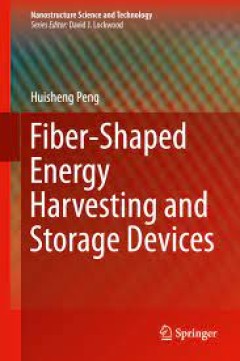
Fiber-Shaped Energy Harvesting and Storage Devices
This comprehensive book covers flexible fiber-shaped devices in the area of energy conversion and storage. The first part of the book introduces recently developed materials, particularly, various nanomaterials and composite materials based on nanostructured carbon such as carbon nanotubes and graphene, metals and polymers for the construction of fiber electrodes. The second part of the book fo…
- Edition
- -
- ISBN/ISSN
- 978-3-662-45744-3
- Collation
- X, 218
- Series Title
- -
- Call Number
- -
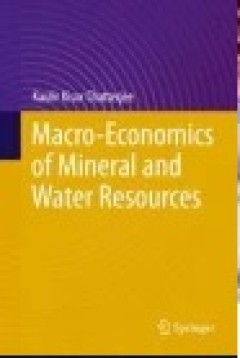
Macro-Economics of Mineral and Water Resources
his book highlights the indispensability of minerals, the vulnerability of humans and issues faced by governments around the world regarding the management of natural resources. It addresses the growing land-ecology-mining conflicts, energy security and water policies of different countries bringing these issues into focus and critically analyzing them. The book discusses the role of government…
- Edition
- -
- ISBN/ISSN
- 978-3-319-15054-3
- Collation
- -
- Series Title
- -
- Call Number
- -

Algae and Environmental Sustainability
This book presents the dynamic role of algae in a sustainable environment. Two major aspects, namely bioenergy and bioremediation, have been elaborated in various chapter contributed by scientists and teachers from different geographical areas throughout the world. Algal biofuels is an emerging area of equal interest to researchers, industries, and policy makers working or focusing on alternati…
- Edition
- Ed. 1
- ISBN/ISSN
- 978-81-322-2641-3
- Collation
- XVIII, 181
- Series Title
- Developments in Applied Phycology
- Call Number
- 576 ALG a

Air Flow Management in Raised Floor Data Centers
The Brief discuss primarily two aspects of air flow management in raised floor data centers. Firstly, cooling air delivery through perforated tiles will be examined and influence of the tile geometry on flow field development and hot air entrainment above perforated tiles will be discussed. Secondly, the use of cold aisle containment to physically separate hot and cold regions, and minimize hot…
- Edition
- Ed. 1
- ISBN/ISSN
- 978-3-319-25892-8
- Collation
- XX, 72
- Series Title
- SpringerBriefs in Applied Sciences and Technology
- Call Number
- 333.79 ARG a

Microorganisms in Biorefineries
The book describes how plant biomass can be used as renewable feedstock for producing and further processing various products. Particular attention is given to microbial processes both for the digestion of biomass and the synthesis of platform chemicals, biofuels and secondary products. Topics covered include: new metabolic pathways of microbes living on green plants and in silage; using lig…
- Edition
- 1
- ISBN/ISSN
- 978-3-662-45208-0
- Collation
- X, 369
- Series Title
- Microbiology Monographs
- Call Number
- -
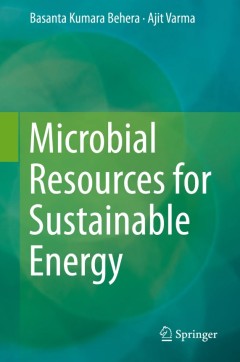
Microbial Resources for Sustainable Energy
This book sheds new light on how microbes can be used as effective and sustainable resources to produce green energy in the form of biogas, algal diesel, ethanol, hydrogen and direct electricity. It discusses topics such as microbial energy conversion technologies, including ethanol production by microbial catalytic reaction, biomethanization, biodiesel from microalgae, microbial fuel cells, an…
- Edition
- 1
- ISBN/ISSN
- 978-3-319-33776-0
- Collation
- XIX, 280
- Series Title
- -
- Call Number
- -
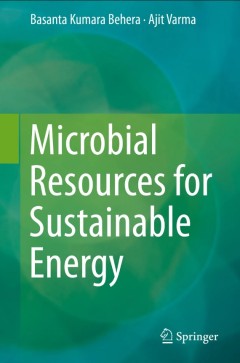
Microbial Resources for Sustainable Energy
This book sheds new light on how microbes can be used as effective and sustainable resources to produce green energy in the form of biogas, algal diesel, ethanol, hydrogen and direct electricity. It discusses topics such as microbial energy conversion technologies, including ethanol production by microbial catalytic reaction, biomethanization, biodiesel from microalgae, microbial fuel cells, an…
- Edition
- 1
- ISBN/ISSN
- 978-3-319-33776-0
- Collation
- XIX, 280
- Series Title
- -
- Call Number
- -
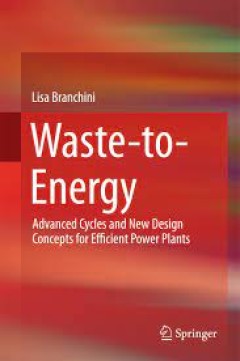
Waste-to-Energy Advanced Cycles and New Design Concepts for Efficient Power …
This book provides an overview of state-of-the-art technologies for energy conversion from waste, as well as a much-needed guide to new and advanced strategies to increase Waste-to-Energy (WTE) plant efficiency. Beginning with an overview of municipal solid waste production and disposal, basic concepts related to Waste-To-Energy conversion processes are described, highlighting the most relevant…
- Edition
- -
- ISBN/ISSN
- 978-3-319-13608-0
- Collation
- XVII, 143
- Series Title
- -
- Call Number
- -
 Computer Science, Information & General Works
Computer Science, Information & General Works  Philosophy & Psychology
Philosophy & Psychology  Religion
Religion  Social Sciences
Social Sciences  Language
Language  Pure Science
Pure Science  Applied Sciences
Applied Sciences  Art & Recreation
Art & Recreation  Literature
Literature  History & Geography
History & Geography